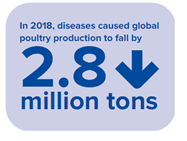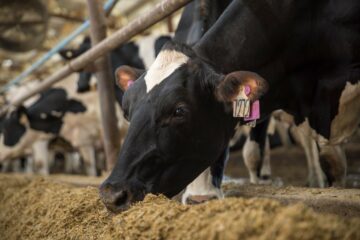Livestock Vaccines: Global Ripple Effect on Animals, Human Health and Sustainability
Mumps, polio, shingles, smallpox, tetanus, coronavirus, flu – these are just a few types of vaccinations available to us.
Vaccines are a simple, safe and effective way to protect us from diseases before we come into contact with them – helping us use our body’s natural defenses to build resistance to specific infections and making our immune systems better able to fight disease. Not all diseases have a corresponding vaccine. For those that do, vaccines basically train the immune system to create antibodies, just like it does when it’s exposed to the disease, so our bodies are more ready to fight the disease if exposed.
Vaccines work the same way in livestock like cows, chickens, turkeys and pigs.
As a veterinarian I took an oath that includes protecting animal health, and livestock vaccines are a vital tool in my toolbox. While they are key to protecting animals from pain and suffering, and sometimes death, there are additional benefits that might surprise you.
When we control livestock disease, there’s a multiplier effect. “Animal Health and Sustainability: A Global Data Analysis,” a recently released report by Oxford Analytica, details the sustainability benefits to our planet on many fronts, including social, environmental and economic.
Social Sustainability
The stark reality is, if there’s less food because farm animals die from disease, more people go hungry. That’s particularly true in developing countries. Higher rates of livestock disease are associated with higher levels of undernourishment and food insecurity globally, while vaccination among livestock is associated with lower levels, according to the report.
The World Organisation for Animal Health estimates that more than 20% of livestock die because of disease each year. This equates to the annual meat consumption needs of about 1.6 billion people and the dairy consumption needs of 2 billion people. The global population is 7.975 billion, so that’s nearly 25% of the world’s population who are missing out on important nourishment because animal protein is lost due to disease!
On average, every two cattle vaccinated each year may contribute to one person avoiding hunger, according to the report. That’s powerful.
Consider a case study from the report. In Nigeria, it’s estimated that 29 million people – out of a population of 206 million – are classified as living with severe food insecurity. Vaccinating 40% of cattle annually translates to lifting 2.4 million people out of severe food insecurity.

Graphic from Health for Animals
Environmental Sustainability
It may feel like a stretch to associate livestock vaccinations and overall health with environmental sustainability, but there’s a direct correlation.
Animal disease is associated with significant increases in livestock greenhouse gas (GHG) emissions and land use. Keeping animals healthy with vaccinations, preventive care and medicines correlates to reductions in both.
When global animal disease levels fall by 10%, Oxford Analytica modeling suggests GHG emissions fall by more than 800 million tons overall – equal to the average emissions of 117 million Europeans. In low-income countries the effect is even more pronounced. An outbreak of cattle disease affecting 20% of a herd is associated with a 60% increase in GHG emissions compared to 42% in high-income countries.
Regarding land use, the modeling found that when 20% of poultry globally are affected by disease each year, an estimated 8.6% more land is necessary to maintain expected production levels. A 40% global vaccination rate for cattle in a given year is associated with a 5.2% reduction in land required for livestock production. Compared to diseased animals, healthy animals optimize growth and require less feed and grazing land. Lower mortality means fewer animals need to be raised, which further reduces land use.

Graphic from Health for Animals
Economic Sustainability
While those of us in the U.S. are incredibly fortunate to live in a higher income country, dire poverty still exists and is even more pronounced in many developing regions across the world. Healthy animals truly are a safety net for the people living in those areas.
Specifically in lower income countries, animals raised for food are an essential driver of economic growth. Consider that more than 1 billion people rely on livestock to not only put food on the table, but also to make a living. Put another way, one in six people worldwide are employed in livestock production. The livelihood of many depends on animal health. If one animal gets sick, or heaven forbid, a disease spreads through a small herd or flock resulting in suffering or death, the consequences can be devastating to the animals, and to the farmers and their families.
Using vaccinations and other approaches to keep animals healthy and productive means families have more money to access better food, healthcare and education. This also means they can contribute to savings and investments for the future and spend money in their communities to help them flourish.

Graphic from Health for Animals
In their report, Oxford Analytica reveals that animal disease has a significant negative impact on productivity and farmer revenue. In 2018 alone, poultry production worldwide was likely reduced by 2.8 million tons due to disease, and in low-income countries, poultry production levels were likely reduced by up to 22%.
The report shows that livestock disease reduces global production by approximately 176 billion pounds of meat and approximately 395 billion pounds of dairy each year, reducing farmer revenue by more than $358 billion.
Conversely, reducing livestock disease by just 1% would bolster meat and dairy farmer revenue by over $14 billion.
Healthy Animals and a Sustainable Future
There’s an intricate connection between animal health and the health of people and our planet.
Keeping animals healthy is vital to addressing some of the world’s most pressing challenges, and vaccines play a critical role. I’m so very thankful that we have vaccines and other tools that help prevent and eradicate disease to help foster a better future for everyone.
If you’re interested in learning more, I encourage you to review the Oxford Analytica report and check out my blog, “Are Healthy Animals the Key to a Healthy World?” You can also learn more about vaccines in this video.
And as always, I’m available to connect and answer your questions! Reach out at @AskDrDorman or by email at AskDrDorman@pahc.com.

